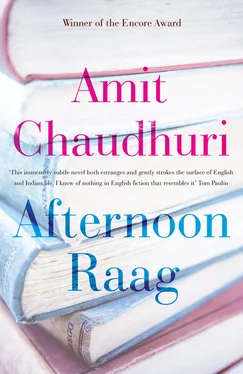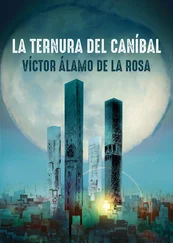Amit Chaudhuri - Afternoon Raag
Здесь есть возможность читать онлайн «Amit Chaudhuri - Afternoon Raag» весь текст электронной книги совершенно бесплатно (целиком полную версию без сокращений). В некоторых случаях можно слушать аудио, скачать через торрент в формате fb2 и присутствует краткое содержание. Год выпуска: 2015, Издательство: Oneworld Publications, Жанр: Современная проза, на английском языке. Описание произведения, (предисловие) а так же отзывы посетителей доступны на портале библиотеки ЛибКат.
- Название:Afternoon Raag
- Автор:
- Издательство:Oneworld Publications
- Жанр:
- Год:2015
- ISBN:нет данных
- Рейтинг книги:3 / 5. Голосов: 1
-
Избранное:Добавить в избранное
- Отзывы:
-
Ваша оценка:
- 60
- 1
- 2
- 3
- 4
- 5
Afternoon Raag: краткое содержание, описание и аннотация
Предлагаем к чтению аннотацию, описание, краткое содержание или предисловие (зависит от того, что написал сам автор книги «Afternoon Raag»). Если вы не нашли необходимую информацию о книге — напишите в комментариях, мы постараемся отыскать её.
Afternoon Raag — читать онлайн бесплатно полную книгу (весь текст) целиком
Ниже представлен текст книги, разбитый по страницам. Система сохранения места последней прочитанной страницы, позволяет с удобством читать онлайн бесплатно книгу «Afternoon Raag», без необходимости каждый раз заново искать на чём Вы остановились. Поставьте закладку, и сможете в любой момент перейти на страницу, на которой закончили чтение.
Интервал:
Закладка:
Stepping outside, into the clear June day, she inhales the air and hugs herself, and, with quick steps, crosses the road confidently, missing two oncoming cars on either side. She feels relieved, as if Oxford were new to her; as if nothing had happened, and she had not known him, or any of the other people. It takes two years of rainy days, of human contact, to feel this moment of freshness. This is what it should have been like in the beginning, not the newcomer’s worries and desires, lived from moment to moment, the reckless craving for companionship and communication. She smiles and nods at the working men in overalls and the scouts coming in; she is happiest acknowledging people she has come to know by sight. She begins to run towards her own college, as the path curves, and students like herself come out in twos and threes from the gate, quite blind to her, and others go past singly and swiftly on bicycles. She is still running down that path lined with bicycles, where flowers have blossomed on the hedges, and the canal flows on the other side. A group of American academics wearing suits, who are here to attend a conference, emerge, unled, in an excited, bustling train from the doorway like schoolchildren who have lost sight of their teacher. She is coming back to her college in the morning, with its comforting hivelike rooms with large windows, in which students have woken up and parted their curtains, and their study-table, books, and table lamp are visible. She must say goodbye to her scout before she forgets, and to the boy who sits in at the porter’s lodge in the evening, who once used to bravely dye his hair different colours; she must give them her address. Then, if she has time, she will walk down to the Bodleian to see if that book she had ordered before her exams has arrived; she still feels tempted, as if it were the treasured vestige of a discarded habit, to take a look at it. Will that leave her enough time to meet her tutor in North Oxford before lunch — that man whose ordinary, trustworthy name appears beneath the complicated and obscure titles of certain books she will put into her bag tonight, who used to write god-like but compassionate notes in an awesome hieroglyphic on the margins of her essays — and then come back in time to help him with his packing for the summer? The thought wearies her. The thought of parting, of never meeting again, of having to repeat to each other that they will see each other in December, of knowing that he will start again; Oxford wearies her. Just to study here, and go to the library, and walk up the stairs and come down again to have a sandwich at lunchtime; she could do that for ever. But it is never as simple as that. If she could choose, what would she choose? She is going back home to her parents and her wonderful, wisecracking sister, she will never mention it to them, and then she will get married. If she is married, she would like to have a baby in a year, it is something she has thought of, in a vague but intense way, for a long time. She will begin another life.
27
The first day I arrived in Oxford, it was raining the fine, persistent, baby-like drizzle in which no one gets wet. Propelled and navigated by my suitcases, I found myself before a window in a centuries-old building which was now run, in a mood of chicanery and make-believe, as a fully operational shelter for scores of bright-spirited graduates in sweaters and jeans. I travelled then to my room in the modern annexe across the road, but returned each day, for food and letters, to that fairy-tale site, with its series of rooftops like witches’ hats, which would disappear in a mist in January, its irregular flagstones outside the steps that had iron rings like knockers upon them (as if they opened onto secret underground entrances), and its mysterious employees who had ranks that set them apart as members of an ancient English sect ‘porter’, ‘steward’, ‘scout’. On my second day, I got a glimpse of Sharma in the dining room in the basement, dressed up like a provincial colonial, walking stiffly in a black suit I was never to see later, wearing it with that exact degree of painfulness that people do in the sweltering tropics, managing to look hot in it even in a cold country. His hair still possessed that neat and combed look imparted to it by an Indian barber, and he wore black-framed spectacles and a pencil-thin moustache, all of which constituted the cargo of his former life that he would lose accidentally, at one stroke, in a matter of weeks. But at that time, with a stern expression on his face, he resembled, with complete accuracy, the discomfited man facing the camera in his old passport photograph.
That was my second day. Even then, Shehnaz and Mandira were waiting to happen to me, for the rain and lack of sunlight had already entered me, from which I would create, inevitably, wisps of fantasy and desire that would later become flesh and bones and blood capable of breaking the heart, becoming one’s own, and then, after a year, again changing into rain and grey light.
That year, I bought myself an Olympia typewriter, and tapped out, with one determined finger, essays and poems upon it. Word-processors and computers were then just coming into use, but I had no patience with the idea of leaving my room and crossing the road to the other building in order to familiarize myself with this new medium. I pretended to ignore it, and with one finger leaping blindly and instinctively from one key to the other, I laboriously but contentedly typed out my first essay on the Olympia. It was a unique object, with its arms fanning out and starting up individually when one touched a letter, a strange balance of mechanical harmony and obedience, an object that in the old days men used to call a ‘machine’, and feel unspeakably different from, a difference that produced both hostility and then later kinship. The computer is not a machine, but an equal in the marketplace, and one enters into no relationship with it, but surrenders to its strategic uses; but, in those days, I had not realized how indispensable it would become, and how its soft monochromatic hum would replace the hellish, Blakean, loud industrial noise of the typewriter.
Sharma, adept as he was at picking up new lifestyles and languages, embraced with generous openness, and without delay, both Wordstar and Wordperfect. With everything that was then new to him — except with meat, for he was an avowed vegetarian — he became friendly: computer-friendly, party-friendly, library-friendly, supermarketfriendly. He was kitchen-friendly as well, and spent a good amount of time making food that emitted an aroma of spices that magnified the sense of what it meant to live in England. Demerara sugar, orange juice, nuts, a spiced lentil mixture he had bought at an Indian shop, and long-life milk were all assigned their places on the bookshelves and the window-sill in his room. ‘Please have some nuts,’ he would say in English; or, in colloquial Hindi, offer me the lentils, scooping up a handful himself and tossing them mouthward. He used to be, then, in a state of constant excitement. When he was in a mood, or under pressure with work, his mind would always be flitting elsewhere, making his movements restless and his manner infuriatingly polite; one could see that he wasn’t listening. But when he was at ease, he would be motherly and genuinely caring, and exude a strength that was strange in one who was so much more a foreigner to this land than I was. The matter-of-fact but buoyant way he began to cook the evening meal, the confidence with which he expressed himself in English, dropping articles and subverting grammar, made me think that my own sense of foreignness, of loneliness, was a luxury and an invention.
In those days, I could hardly experience England without being obtruded by what I had read about it in its literature and history. And even my compulsive nostalgia for home was half-imaginary. For Sharma, perception was a different thing; he discovered England afresh, and on him its impact was more direct, more immediately generous than it was on me; and yet, outwardly, he remained untouched. He had read Wordsworth and Shakespeare in India in Hindi translation; he loved Macbeth , especially the scene in which Birnam Wood moves forward; he was not shy of picking up English customs or making English friends; and if he yearned for home, he did not mention it. Yet he did not exchange his persona for a new one, as many city-educated Indians do in England; he remained still and deep. The choices that existed in my world — between clinging to my Indianness, or letting it go, between being nostalgic or looking toward the future — did not exist in his. He was from a village in North India, and it was miraculous that he should be here in Oxford among other Indians of a different class, and it was the miracle of being in Oxford, of knowing Shehnaz, Mandira, of future meetings, incarnations, new faces, that I would become aware of when I was with him.
Читать дальшеИнтервал:
Закладка:
Похожие книги на «Afternoon Raag»
Представляем Вашему вниманию похожие книги на «Afternoon Raag» списком для выбора. Мы отобрали схожую по названию и смыслу литературу в надежде предоставить читателям больше вариантов отыскать новые, интересные, ещё непрочитанные произведения.
Обсуждение, отзывы о книге «Afternoon Raag» и просто собственные мнения читателей. Оставьте ваши комментарии, напишите, что Вы думаете о произведении, его смысле или главных героях. Укажите что конкретно понравилось, а что нет, и почему Вы так считаете.












